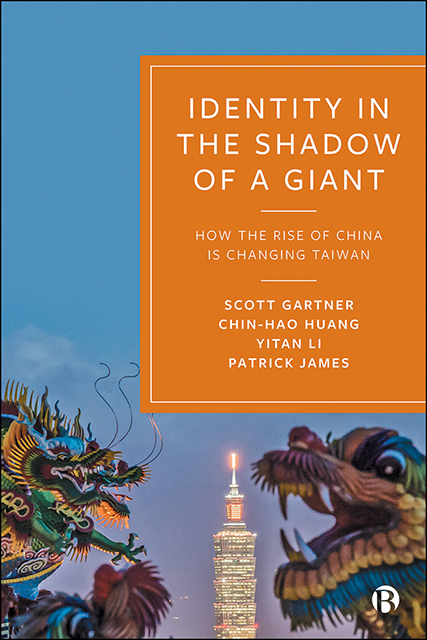Book contents
- Frontmatter
- Dedication
- Contents
- List of Figures and Tables
- About the Authors
- Acknowledgements
- Preface
- 1 Identity in the Shadow of a Giant: How the Rise of China Is Changing Taiwan
- 2 Taiwan in Historical Perspective
- 3 The Problématique of Taiwanese Identity
- 4 Theorizing about Identity, Change in Capabilities and Dyadic Relations: An Approach Based on Analytic Eclecticism and Systemism
- 5 Elite Reflections
- 6 Popular Reflections (Survey I)
- 7 Factors Influencing Identifying Only as Taiwanese: A Layered Empirical Approach (Survey II)
- 8 A New Vision of Taiwanese Identity, the Rise of China, Cross-Strait Relations and the United States in Northeast Asia
- Appendix A Research Interview Questions, September–October 2015
- Appendix B Taiwanese Identity and the Rise of China: Survey Questions, 27 October 2015
- Appendix C Taiwan National Security Survey by Emerson Niou
- References
- Index
6 - Popular Reflections (Survey I)
Published online by Cambridge University Press: 15 April 2023
- Frontmatter
- Dedication
- Contents
- List of Figures and Tables
- About the Authors
- Acknowledgements
- Preface
- 1 Identity in the Shadow of a Giant: How the Rise of China Is Changing Taiwan
- 2 Taiwan in Historical Perspective
- 3 The Problématique of Taiwanese Identity
- 4 Theorizing about Identity, Change in Capabilities and Dyadic Relations: An Approach Based on Analytic Eclecticism and Systemism
- 5 Elite Reflections
- 6 Popular Reflections (Survey I)
- 7 Factors Influencing Identifying Only as Taiwanese: A Layered Empirical Approach (Survey II)
- 8 A New Vision of Taiwanese Identity, the Rise of China, Cross-Strait Relations and the United States in Northeast Asia
- Appendix A Research Interview Questions, September–October 2015
- Appendix B Taiwanese Identity and the Rise of China: Survey Questions, 27 October 2015
- Appendix C Taiwan National Security Survey by Emerson Niou
- References
- Index
Summary
Overview
This chapter reports and assesses popular reflections on the basis of evidence gathered during an online survey in 2015. The contents of the survey permit assessment of Taiwanese voters’ participation and identity formation, along with their views about cross-Strait relations and the role of the US in Northeast Asia. Evidence gathered through the surveys strongly corroborates the patterns from elite reflections and interviews reported in the preceding chapter while also offering data on some aspects that have been covered less so far.
This chapter provides empirical support for the theoretical approach of analytic eclecticism and systemism described in Chapter 4. As shown in that theoretical chapter, the issue of Taiwanese identity, the rise of China, cross-Strait relations and the US presence in Northeast Asia cannot be satisfactorily and effectively explained with one single theoretical paradigm. Several prevailing International Relations paradigms – realism, liberalism and constructivism – would lead the dynamics of cross-Strait relations in their respectively distinct directions. Empirical evidence presented in this chapter, together with material presented in the preceding and next chapter, is part of the effort to unite inter-paradigm ideas and evidence to produce improved explanations of what goes on across the Taiwan Strait.
Work in this chapter on survey results for popular reflections unfolds in three following sections. The second section conveys basic traits of the survey and sample. The third section offers analysis and synthesis by linking elite interviews with surveys on issues that pertain to the political economy of China's rise, cross-Strait relations, Taiwanese identity and US activity in Northeast Asia. The fourth and final section sums up the contributions of the chapter and sets the stage for the second survey that follows in Chapter 7.
Basic traits of the survey and sample
Conducted by Frank C.S. Liu of the Institute of Political Science at the National Sun Yat-Sen University between 20 November and 14 December 2015, the online survey collected 824 valid responses. The distribution of respondents in the sample includes 38.2 per cent from northern Taiwan, 19.3 per cent from central Taiwan, 30.8 per cent from southern Taiwan and 2.5 per cent from eastern Taiwan.
- Type
- Chapter
- Information
- Identity in the Shadow of a GiantHow the Rise of China is Changing Taiwan, pp. 125 - 154Publisher: Bristol University PressPrint publication year: 2021



